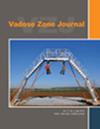计算非饱和土壤导水性的平均值或加域导水性
IF 2.8
3区 地球科学
Q3 ENVIRONMENTAL SCIENCES
引用次数: 0
摘要
最近的非饱和水力传导曲线(UHCC)模型是毛细管水、薄膜水和水蒸气域的独立 UHCC 的总和。这需要平行的、不相互影响的域。本文提出了一个理论框架,用于将域电导率聚合为整体土壤 UHCC,以确定并可能放宽有关域配置的隐含假设。论文提出了可与蒸汽电导率进行算术平均的液-水电导率的算术平均、谐波平均和几何平均。然而,目前的毛细管电导率和薄膜电导率模型都是固有的,即在各自的领域内有效。蒸汽电导率是一种体积电导率,也就是说,它给出的是气体域在土壤中的电导率。转换关系使用域体积分数作为未知加权因子的近似值,在固有电导率和体积电导率之间进行转换。这有助于对域电导率进行一致的平均。即使采用一致的平均值,基于畴导电率的 UHCC 真正物理精确模型从根本上说也是难以实现的。不过,基于三个平均值和域电导率的非加权和的模型可以很好地拟合两种土壤的数据,但在干燥范围内会出现偏差。毛细管水和薄膜水的拟合曲线取决于平均(或添加)方法。因此,它们并不是各自领域的严格特征。真正的固有域电导率函数可能无法确定。本文章由计算机程序翻译,如有差异,请以英文原文为准。
Averaging or adding domain conductivities to calculate the unsaturated soil hydraulic conductivity
Recent models of the unsaturated hydraulic conductivity curve (UHCC) are the sum of separate UHCCs for domains of capillary water, film water, and water vapor. This requires parallel, noninteracting domains. A theoretical framework for aggregating domain conductivities to a bulk soil UHCC is presented to identify and possibly relax implicit assumptions about domain configuration. The paper develops arithmetic, harmonic, and geometric averages of the liquid-water conductivities that can be arithmetically averaged with the vapor conductivity. However, current models for capillary and film conductivities are intrinsic, that is, valid within their respective domain. The vapor conductivity is a bulk conductivity, that is, it gives the conductivity of the gaseous domain as it manifests itself in the soil. Conversion relationships use the domain volume fractions as approximations of the as-yet unknown weighting factors to convert between intrinsic and bulk conductivities. This facilitates consistent averaging of domain conductivities. Even with consistent averaging, a truly physically accurate model of the UHCC based on domain conductivities is fundamentally elusive. Nevertheless, models based on the three averages and the unweighted sum of the domain conductivities produce good fits to data for two soils but diverge in the dry range. The fitted curves for the capillary and film water depend on the averaging (or adding) method. Hence, they are not strictly characteristic of their respective domains. The true intrinsic domain conductivity functions may be impossible to determine.
求助全文
通过发布文献求助,成功后即可免费获取论文全文。
去求助
来源期刊

Vadose Zone Journal
环境科学-环境科学
CiteScore
5.60
自引率
7.10%
发文量
61
审稿时长
3.8 months
期刊介绍:
Vadose Zone Journal is a unique publication outlet for interdisciplinary research and assessment of the vadose zone, the portion of the Critical Zone that comprises the Earth’s critical living surface down to groundwater. It is a peer-reviewed, international journal publishing reviews, original research, and special sections across a wide range of disciplines. Vadose Zone Journal reports fundamental and applied research from disciplinary and multidisciplinary investigations, including assessment and policy analyses, of the mostly unsaturated zone between the soil surface and the groundwater table. The goal is to disseminate information to facilitate science-based decision-making and sustainable management of the vadose zone. Examples of topic areas suitable for VZJ are variably saturated fluid flow, heat and solute transport in granular and fractured media, flow processes in the capillary fringe at or near the water table, water table management, regional and global climate change impacts on the vadose zone, carbon sequestration, design and performance of waste disposal facilities, long-term stewardship of contaminated sites in the vadose zone, biogeochemical transformation processes, microbial processes in shallow and deep formations, bioremediation, and the fate and transport of radionuclides, inorganic and organic chemicals, colloids, viruses, and microorganisms. Articles in VZJ also address yet-to-be-resolved issues, such as how to quantify heterogeneity of subsurface processes and properties, and how to couple physical, chemical, and biological processes across a range of spatial scales from the molecular to the global.
 求助内容:
求助内容: 应助结果提醒方式:
应助结果提醒方式:


